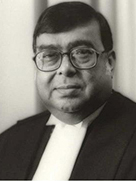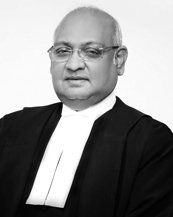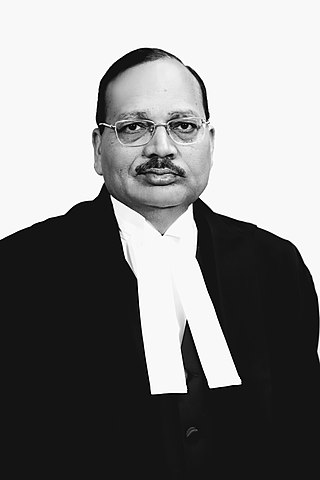
Arun Jaitley was an Indian politician and attorney. A member of the Bharatiya Janata Party,Jaitley served as the Minister of Finance and Corporate Affairs of the Government of India from 2014 to 2019. Jaitley previously held the cabinet portfolios of Finance,Defence,Corporate Affairs,Commerce and Industry,and Law and Justice in the Vajpayee government and Narendra Modi government.

Konakuppakatil Gopinathan Balakrishnan is an Indian judge who served as Chief Justice of the Supreme Court of India and later the Chairperson of the National Human Rights Commission of India. He was the first judge from Kerala to become the Chief Justice of the Supreme Court. His tenure lasting more than three years has been one of the longest in the Supreme Court of India. While being Chief Justice of Gujarat High Court,he was appointed as the Acting Governor of Gujarat from 16th January 1999 to 18th March 1999.In 2010,he was conferred with an honorary doctorate by Cochin University of Science and Technology.
Reservation is a system of affirmative action in India that provides historically disadvantaged groups representation in education,employment,government schemes,scholarships and politics. Based on provisions in the Indian Constitution,it allows the Union Government and the States and Territories of India to set reserved quotas or seats,at particular percentage in Education Admissions,Employments,Political Bodies,Promotions,etc,for "socially and educationally backward citizens."

Altamas Kabir was an Indian lawyer and judge who served as the 39th Chief Justice of India.

Ranjan Gogoi is an Indian former advocate and former judge who served as the 46th Chief Justice of India from 2018 to 2019,having previously served as a Judge of the Supreme Court of India from 2012 to 2018. He is serving as a Member of the Rajya Sabha,having been nominated by President Ram Nath Kovind on 16 March 2020. Gogoi served as a judge on Gauhati High Court from 2001 to 2010,and then was transferred as a judge to Punjab and Haryana High Court from 2010 to 2011 where he later became chief justice from 2011 to 2012. He is also serving as a member of the Committee on External Affairs in the Rajya Sabha.

Dipak Misra is an Indian jurist who served as the 45th Chief Justice of India from 28 August 2017 till 2 October 2018. He is also former Chief Justice of the Patna High Court and Delhi High Court. He is the nephew of Justice Ranganath Misra,who was the 21st Chief Justice from 1990 to 1991.

Umesh Chandra Banerjee was a Bengali Indian jurist,who served as the chief justice of the Hyderabad High Court in 1998. He had also served as a permanent judge of the Calcutta High Court and as a judge of the Supreme Court of India.
{{Infobox officeholder jjjhxaMb | name = N. V. Ramana | honorific-suffix = | image = N. V. Ramana.jpg | caption = Ramana in 2021 | order = 48th | office = Chief Justice of India | termstart = 24 April 2021 | termend = 26 August 2022 | appointer = Ram Nath Kovind | predecessor = Sharad Arvind Bobde | successor = Uday Umesh Lalit | office1 = Judge of the Supreme Court of India | term_start1 = 17 February 2014 | term_end1 = 23 April 2021 | nominator1 = P. Sathasivam | appointer1 = Pranab Mukherjee | predecessor2 = Badar Durrez Ahmed (acting) | successor2 = Badar Durrez Ahmed (acting) | office2 = Chief Justice of the Delhi High Court | term_start2 = 2 September 2013 | term_end2 = 16 February 2014 | nominator2 = P. Sathasivam | appointer2 = Pranab Mukherjee | office3 = Acting Chief Justice of Andhra Pradesh High Court | termstart3 = 10 March 2013 | termend3 = 20 May 2013 | appointer3 = Pranab Mukherjee | office4 = Judge of Andhra Pradesh High Court | nominator4 = Adarsh Sein Anand | appointer4 = K. R. Narayanan | termstart4 = 27 June 2000 | termend4 = 1 September 2013 | birth_name = Nuthalapati Venkata Ramana | birth_date = 27 August 1957 | birth_place = Ponnavaram,Andhra Pradesh,India | children = | alma_mater = | education = | residence = | citizenship = Indian}}

Uday Umesh Lalit is an Indian lawyer and former Supreme Court Judge,who served as the 49th Chief Justice of India. Previously,he has served as a judge of Supreme Court of India. Prior to his elevation as a judge,he practised as a senior counsel at the Supreme Court. Justice Lalit is one of the six senior counsels who have been directly elevated to the Supreme Court. He is currently a distinguished jurist and Professor of Law and Justice at O.P. Jindal Global University.

Dinesh Maheshwari is a former Judge of the Supreme Court of India. He is a former Chief Justice of the Karnataka High Court &High Court of Meghalaya. He took the oath as a Judge of Rajasthan High Court on 2 September 2004. He was transferred to the Allahabad High Court and remained senior Judge at the Lucknow Bench of Allahabad High Court from 2 March 2015. He took oath as Chief Justice of the High Court of Meghalaya on 24 February 2016. On transfer to Karnataka,Justice Maheshwari took oath as 30th Chief Justice of High Court of Karnataka on 12 February 2018. He took oath as Judge of the Supreme Court of India on 18 January 2019.
Economically Weaker Section (EWS) in India is a subcategory of people having an annual family income less than ₹8 lakh (US$10,000) and who do not belong to any category such as SC/ST/OBC across India,nor to MBC in Tamil Nadu. A candidate who does not fall under SC/ST/OBC and fulfils the EWS economic criteria are to be part of the EWS category.

Sudhanshu Dhulia is a judge of the Supreme Court of India. He is former chief justice of the Gauhati High Court and judge of the Uttarakhand High Court.

Mukeshkumar Rasikbhai Shah is a former judge of the Supreme Court of India,former chief justice of the Patna High Court and a former judge of Gujarat High Court.

Suryakant Sharma is an Indian judge of the Supreme Court of India,set to become the 53rd Chief Justice of India,if the convention of seniority is followed. Prior to his elevation as judge,Kant was a Senior Advocate and also served as the Advocate General for Haryana.
The One Hundred and Third Amendment of the Constitution of India,officially known as the Constitution Act,2019,introduces 10% reservation for Economically Weaker Sections (EWS) of society for admission to Central Government-run educational institutions and private educational institutions,and for employment in Central Government jobs. The Amendment does not make such reservations mandatory in State Government-run educational institutions or State Government jobs. However,some states have chosen to implement the 10% reservation for economically weaker sections.
Nongmeikapam Kotiswar Singh is an Indian Judge. Presently,he is Chief Justice of Jammu &Kashmir and Ladakh High Court. He is former Judge of Gauhati High Court and Manipur High Court. He has also served as the Acting Chief Justice of Gauhati High Court for three times and Acting Chief Justice of Manipur High Court for two times.
Justice Ravindra Maithani is an Indian Judge at the High Court of Uttarakhand at Nainital since December 2018. He is due to retire not earlier than June 2027.
Article 15 of the Constitution of India forbids discrimination on grounds only of religion,race,caste,gender,or place of birth. It applies Article 14's general principle of equality in specific situations by forbidding classifications made on protected grounds. While prohibiting discrimination based on prejudice,the Article is also the central issue in a large body of judicial decisions,public debate,and legislation revolving around affirmative action,reservations,and quotas. As of the 103rd Amendment of the Constitution of India,Article 15.

Pamidighantam Sri Narasimha is a judge of the Supreme Court of India. He is former Additional Solicitor General of India. He is well known for his work on the Ayodhya Title Dispute and the BCCI cases.

Devu G. versus State Of Kerala &Ors.(2023) is the case where Supreme Court granted special leave to appeal for a queer petitioner who received an unfavourable ruling in a High Court. The petitioners appealed the order of the Kerala High Court that directed a queer woman detained by her parents,against her wishes,to attend counselling sessions. The Supreme Court stayed the order on 6 February 2023.













